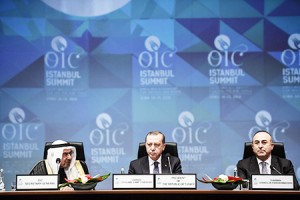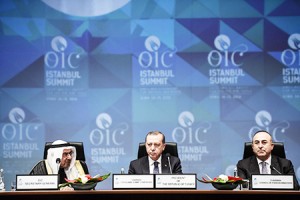Newsweek Pakistan

The Organization of Islamic Cooperation (OIC) meeting in Istanbul unsurprisingly saw a majority of Muslim states condemn Iran for “supporting terrorism and meddling in the affairs of other countries.” This simply revealed the extent to which “revolutionary” Iran has isolated itself over the past decades. It also revealed the rise of sectarian conflict among Muslims and the growing inability of the Arab states to avoid a domestic Salafi drive toward a narrow definition of Islam. Needless to say, Iranian President Hassan Rouhani did not attend the closing meeting of the 30 heads of state in protest.
None of this was surprising in light of what has transpired in the Middle East and the Gulf region in recent times, yet it was unprecedented because the OIC had always avoided internally divisive issues, relying on preparatory ministerial meetings to steer clear of issues they didn’t agree on. A moderate President Rouhani must have felt Iran’s marginalization as Saudi Arabia successfully harnessed the support of other OIC states against it.
Before the 1979 Islamic revolution in Iran, the region was multi-sect, in which Shia minorities kept a low profile to avoid persecution by the ruling sheikhs. The revolution encouraged in them a sense of awakening from old quietism and caused the Sunni Arabs to respond with apostatizing fatwas. The Shia majority in Iraq was “liberated” in 2003 by the American invasion, and subsequent democratic reform brought a Shia government to power which proceeded to persecute the Sunni minority. The Shia majorities in Bahrain and Lebanon also asserted themselves, at times with a little help from Tehran. In Saudi Arabia, Salafi scholars forced the Kingdom to deal with its Shia community with an iron hand.
Iran, a big state facing Arab statelets population-wise, scares local rulers into extreme action, as regrettably witnessed currently in Yemen. Kuwait, where the ruling sheikh is soft on Shias and runs an elected parliament, has a hard time convincing Sunni parliamentarians not to legislate against them. The most negative fallout of this sectarianism is the covert Sunni support terrorist outfits like the Islamic State and Al Qaeda are able to garner; and nonsectarian states, like Pakistan, whose founder was a Shia, suffer Arab-funded “relocated” carnages of their Shia population. The Islamic world is facing a dark future ahead as the global economy continues to decline and the Big Powers, no longer too oil-dependent, are inclined to leave Muslims alone to their mess.



